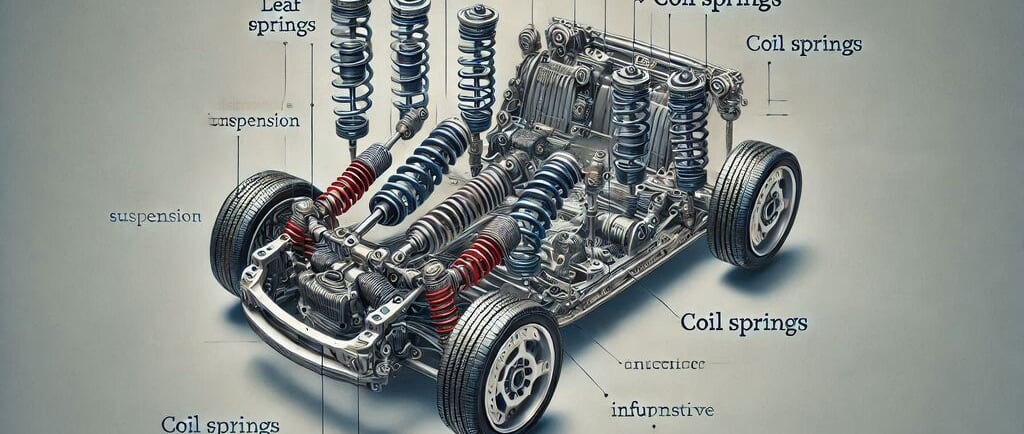Leaf Springs and Coil Springs
If you've ever driven over a bumpy road and wondered what keeps your vehicle stable, you can thank the suspension system—especially the springs.
SUSPENSION PARTS
11/14/20244 min read


Leaf Springs vs. Coil Springs: Which Suspension is Right for Your Vehicle?
If you've ever driven over a bumpy road and wondered what keeps your vehicle stable, you can thank the suspension system—especially the springs. Leaf springs and coil springs are two key types used in vehicles, each offering distinct benefits based on the type of driving and load capacity. Choosing the right suspension system can make a world of difference in comfort, performance, and durability.
In this guide, we’ll take a closer look at how leaf springs and coil springs work, their unique advantages, and which might be best suited for your driving needs.
Understanding the Basics: What Are Leaf Springs and Coil Springs?
Leaf Springs
Leaf springs are one of the oldest types of suspension systems, dating back to the horse-drawn carriage era. They consist of multiple layers of steel or composite materials stacked on top of each other to form a “leaf” shape. This design is ideal for supporting heavy loads, making it a popular choice for trucks, vans, and off-road vehicles.
Structure: Leaf springs are typically mounted to the rear axle, creating a solid connection between the axle and the vehicle's frame.
Usage: They are commonly used in vehicles that need to carry heavy loads, such as pickup trucks, SUVs, and heavy-duty trucks.
Coil Springs
Coil springs, on the other hand, are a more modern suspension type and are widely used in passenger cars. They are made from a single piece of metal coiled into a spiral shape, similar to the spring in a ballpoint pen, and can compress and expand based on the terrain and driving conditions.
Structure: Coil springs are generally lighter and more compact than leaf springs, which allows for greater flexibility in suspension design.
Usage: Coil springs are commonly found in cars, light trucks, and sports vehicles due to their smooth ride quality and handling benefits.
Key Differences Between Leaf Springs and Coil Springs
1. Ride Quality and Comfort
Leaf Springs: Due to their rigid design, leaf springs offer a firm ride that is well-suited for heavy loads but can be somewhat rough on bumpy roads.
Coil Springs: Known for their flexibility, coil springs provide a smoother and more comfortable ride, absorbing bumps and reducing road vibrations.
Example: If you’re frequently driving off-road or on rough terrain, leaf springs might feel too rigid. In contrast, coil springs would provide a smoother experience on everyday paved roads.
2. Load-Bearing Capacity
Leaf Springs: Built for heavy-duty performance, leaf springs can handle significant weight, making them ideal for vehicles that frequently transport heavy cargo.
Coil Springs: Coil springs are generally designed for lighter loads and are more common in passenger vehicles that prioritize comfort over load capacity.
Real-life scenario: If you’re a contractor who frequently hauls equipment in a truck, leaf springs would support the added weight better than coil springs.
3. Durability and Maintenance
Leaf Springs: Thanks to their sturdy construction, leaf springs are highly durable and can withstand a lot of wear and tear. They also require minimal maintenance.
Coil Springs: While coil springs provide better comfort, they can wear out more quickly, especially under heavy loads, requiring occasional replacements.
Pros and Cons: Leaf Springs vs. Coil Springs
Leaf Springs: Pros and Cons
Pros:
Excellent load-bearing capacity
Durable and long-lasting
Requires minimal maintenance
Ideal for heavy-duty and off-road vehicles
Cons:
Can lead to a rougher ride
Limited flexibility in suspension tuning
Heavier, which can impact fuel efficiency
Coil Springs: Pros and Cons
Pros:
Provides a smoother, more comfortable ride
Lighter weight improves handling and fuel efficiency
Greater flexibility in suspension design
Cons:
Less effective for heavy-duty load-bearing
Can wear out faster under frequent or heavy loads
May require more frequent maintenance
Choosing the Right Suspension for Your Needs
Best for Heavy Loads and Off-Roading: Leaf Springs
If you regularly drive in rugged environments or need to transport heavy loads, leaf springs are the clear choice. Their robust design provides stability and strength, reducing sagging under heavy weight. For those who drive pickup trucks or heavy-duty SUVs, leaf springs can offer the durability and support needed for tough jobs.
Best for Comfort and Everyday Use: Coil Springs
For drivers who prioritize comfort and smooth handling, coil springs are ideal. Passenger cars, sports cars, and luxury vehicles commonly use coil springs to ensure a comfortable ride, even on less-than-perfect roads. If you’re mostly driving on paved roads and don’t require extra load capacity, coil springs can deliver a great balance of comfort and control.
Upgrading Your Suspension: Things to Consider
1. Weight Requirements
Think about the weight your vehicle carries regularly. If you haul equipment or travel with heavy cargo, leaf springs will likely hold up better over time. On the other hand, if you’re simply commuting or enjoying weekend drives, coil springs should provide ample support and comfort.
2. Driving Conditions
Consider the types of roads you frequent. Off-road adventurers often lean toward leaf springs, as they can withstand the bumps and stresses of rough terrain. For smooth city streets and highways, coil springs are preferred for their ability to absorb road shocks and vibrations.
3. Vehicle Type
Some vehicles are naturally better suited for one suspension type. Trucks and utility vehicles benefit from leaf springs for strength and durability, while most passenger cars perform well with coil springs. Make sure to choose a suspension that matches your vehicle's purpose and design.
Final Thoughts: Leaf Springs and Coil Springs – Which is Right for You?
Choosing between leaf springs and coil springs boils down to understanding your vehicle’s needs and your driving style. If you require heavy-duty support for hauling and rugged terrain, leaf springs are a reliable choice. If you prioritize comfort and control on city roads, coil springs will likely serve you well.


